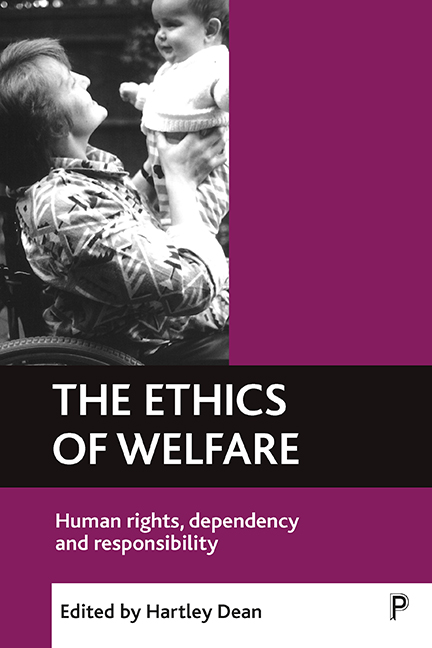ten - Reconceptualising dependency, responsibility and rights
Published online by Cambridge University Press: 20 January 2022
Summary
This book demonstrates the ways in which dependency, responsibility and rights are connected. Part One argued that any concept of rights capable of encompassing rights to social welfare must be premised on a celebration of human interdependency and an ethical concept of social responsibility: it requires a politics of needs interpretation and an ethic of coresponsibility. Embracing human interdependency means rethinking the context in which we can, nonetheless, demand autonomy as human beings. Autonomy is not the same as self-sufficiency. Conceptualising social responsibility means transcending ethically constrained notions of duty, obligation or obedience so as to bring moral sensibility to bear upon the ethics of the public sphere.
Part Two recounted findings from recent empirical research concerning popular and welfare provider discourses. It shows that such discourses can recognise that interdependency is an unavoidable feature of the human life course and that certain kinds of rights do attach to people by virtue of their humanity. But, insofar that such discourses tend to construe responsibility in essentially individualistic ways, they do not generally translate a recognition of interdependency into an acceptance of universal social or welfare rights. Indeed, welfare providers may be especially hostile to unconditional rights to welfare.
Part Three focused primarily on the perspectives of welfare service users: the way they negotiate their dependency on the state, the nature of the disciplines to which they are subject and the ways in which they understand their individual responsibilities. Individuals and households in welfare state societies are all to some extent dependent on the state and all are involved in strategies by which to advance their well-being. Yet, while certain of them are targeted by state interventions designed to construct them as responsible labour market participants, even those who might be adjudged irresponsible insofar that they have failed to contribute through local taxes quite clearly have their own standards and ideas about responsibility that are independent of the state’s requirements.
This final chapter aims to bring together some of the several arguments that have been developed so far. It proposes, first, to amplify the argument that human relationships and the interdependency they entail are a good in and of themselves; that ‘third way’ notions of responsibility are ethically deficient; and that prevailing concepts of rights remain fundamentally impoverished.
- Type
- Chapter
- Information
- The Ethics of WelfareHuman Rights, Dependency and Responsibility, pp. 193 - 210Publisher: Bristol University PressPrint publication year: 2004

